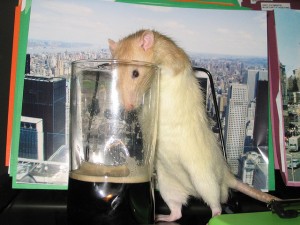THE OXFORD COMPANION TO BEER

CC adria.richards on Flickr
The beer swilling blogeratti are in the throes of some rather vigorous debates online about the recently published ‘Oxford Companion to Beer’ with two distinct points of view emerging about beer writing in general, and particularly the approach to the history of beer (see here for Nazi’s, here for Pete Brown’s view, here for a good beer blog’s debate and here for Zythophile’s view). Martyn Cornell (Zythophile) has been scathing in his comments and blog posts and has raised the heckles of the book’s editor, Garrett Oliver, and that ‘ego-driven tooth fairy of beer blogs’ (quote from a comment by FlagonofAle – steady on, FOA) Pete Brown.
Cornell’s criticism centres on numerous factual errors, which you can read more of on his blog post referenced above. A wiki has been set up by Alan McLeod to address the errors and it has had 40 corrections and comments to date.
I’m siding with Martyn on this one – As he says in relation to the errors he has issue with “..given the OCB’s inevitable status as a product of the Oxford University Press, those errors I believed I had killed off are now going to be repeated again and again. And I thought: “Why did I spend seven years researching a book, while trying to maintain the most rigorous standards of accuracy, and not let any story I had been unable to verify get through, only to have the OUP come and piss over my work?”’
We were heartened to find that our theory has been acknowledged in the Ireland section. The OCB states that ‘the earliest form of beoir (Gaelic for beer) in Ireland is believed to have been brewed in the Bronze Age”. That’s true. However it is probable that there were earlier brews, and the evidence from Scotland certainly indicates that our island neighbours were brewing earlier. The entry then goes on to state that ‘the discovery of a possible brewery site, a fulacht fiadh (grass covered mound) by archaeologists Declan Moore and Billy Quinn in Cardarragh, Co. Galway, led to the test brewing of a gruit..’.
Not meaning to be overly pedantic, but we didn’t discover a fulacht in Cardarragh (which should be Cordarragh) – we did our experiments in Billy’s backyard in Cordarragh. We also feel that we should stress our often stated point that the fulacht fiadh was possibly multifunctional, the kitchen sink of the Bronze Age with many conceivable uses. As Pat McGovern states in his book ‘Ancient Wine’ (to our delight), our suggestion is ‘mind-boggling’, but he points out, quite correctly, that there’s an absence of spent grain to confirm our idea (we have responded to that argument here on the blog – do a search for ‘spent grain’ is you are really interested). We posited that these sites may have been used for brewing and that in our opinion, they were Bronze Age micro-breweries. There has been no definitive physical evidence for our theory and we have regularly stated that it is a plausible theory, and one we will happily argue, but it is just that – a theory.
This entry was posted on Friday, December 2nd, 2011 at 1:34 pm. It is filed under About the Beer and tagged with archaeology, Beer, Fulacht fiadh, Ireland, Oxford Companion to Beer.
You can follow any responses to this entry through the RSS 2.0 feed.




Pleasingly, Martyn was given the award for best online writer at the British Guild of Beer Writers annual do last night.
The OCB also says Dingle is in “County Derry”. Close… sort of.
Congrats to Martyn..
Beats me why they didn’t have an Irish contributor to do the Ireland entry!